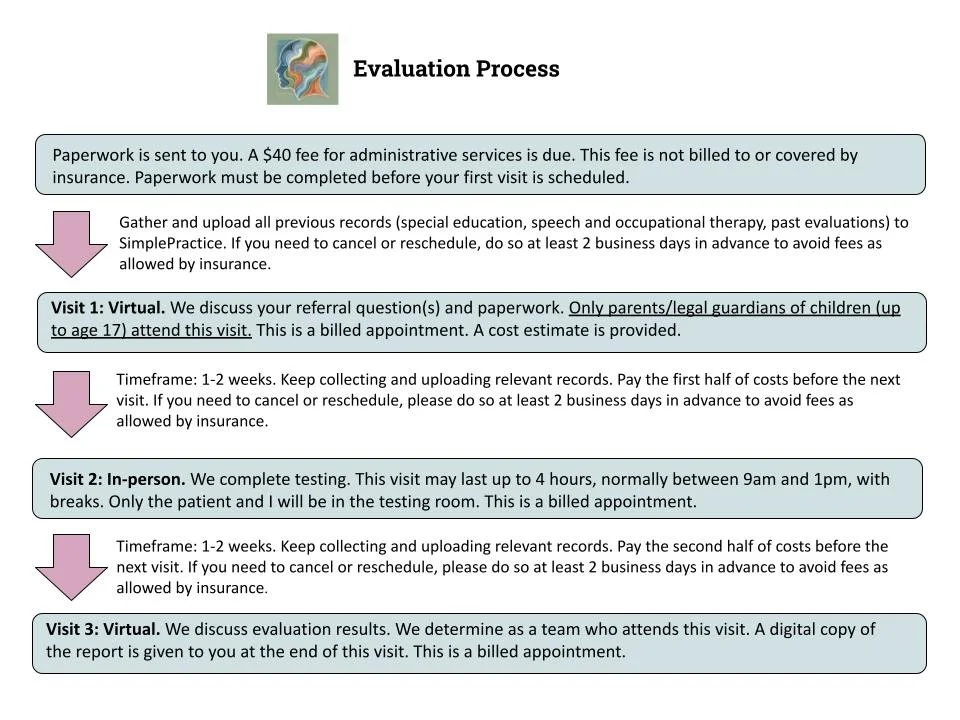FAQs & FYIs
When should I consider a psychological evaluation?
You and/or other professionals would like clarity about a diagnosis.
There is uncertainty about why things are challenging in social, emotional, and/or academic realms.
You have tried services and/or intervention to address your concerns, but they have not helped as expected.
You want to advocate for additional support at school or work.
You would like tailored and specific recommendations for home, school, and treatment.
You would like a better understanding of strengths and areas for growth and support.
What type of evaluation do I or does my child need?
What are your goals?
Psychological evaluation: To understand emotional, behavioral, and cognitive functioning, and obtain recommendations for treatment, accommodations, and support. It is typically used for individuals seeking insight into their mental health, learning or thinking differences, or overall psychological wellbeing.
Neuropsychological evaluation: To have an in-depth understanding of brain function and how it impacts thinking, learning, emotions, and behavior. It is typically used for complex neurological concerns (e.g., traumatic brain injury, dementia, brain abnormalities, etc.).
School-based evaluation: To determine if a student qualifies for special education services via an Individualized Education Program (IEP) or accommodations (504 plan) in a school setting. Focuses on a child’s areas of strength and difficulty as they impact school functioning. It often includes a very comprehensive assessment of learning and academic abilities.
Mental health assessment by a therapist: To identify emotional, behavioral, or mental health concerns to guide therapy or other interventions.
What question(s) can Dr. Lopach help answer?
Dr. Lopach provides autism, ADHD, learning, and cognitive evaluations for individuals across the lifespan.
Dr. Lopach is not the best fit for individuals with questions or concerns about bipolar disorders, eating disorders, psychotic disorders, addiction, or dementia.
What are important questions to ask my insurance company beforehand?
Do I need pre-authorization for mental health services and assessments/evaluations?
What is my deductible, out-of-pocket maximum and, if applicable, what is my out-of-network deductible for outpatient mental health visits and psychological assessments/evaluations?
How much of my deductible has been met this year?
How much of my out-of-pocket maximum has been met this year?
What is my out-of-network coinsurance for outpatient mental health services (i.e., percentage reimbursed)?
Do I need a referral from an in-network provider or primary care physician to see an in- or out-of-network specialist?
How do I submit claims for out-of-network reimbursement?
Is there a session limit for outpatient mental health visits?
How do I explain this process to my child?
When introducing an assessment to your child, avoid the word “testing,” which can feel intimidating. Instead, explain that they're meeting someone to learn more about how they think, so you and their teachers can support them better. You might say, “We’ll work with someone who will help us better understand and support you at home and school. You’ll do activities to help us figure out how you think and learn. We will learn about all your strengths and help us understand why things are feeling tricky.” Reassure young children by explaining the psychologist is a “different kind of doctor” who helps understand their brain—no shots, nothing is wrong. For older kids, assure them it’s private and focused on solutions. Encourage them to ask questions about the process. Describing the assessment positively can make them feel respected, more willing to participate, and see it as a way to make school or home life feel easier.
This resource provides more tips and details: Preparing Your Child for Testing
What are possible evaluation outcomes?
Assignment of a medical diagnosis or diagnoses.
Determination that no diagnosis applies.
A need for further information for a conclusive diagnostic impression.

